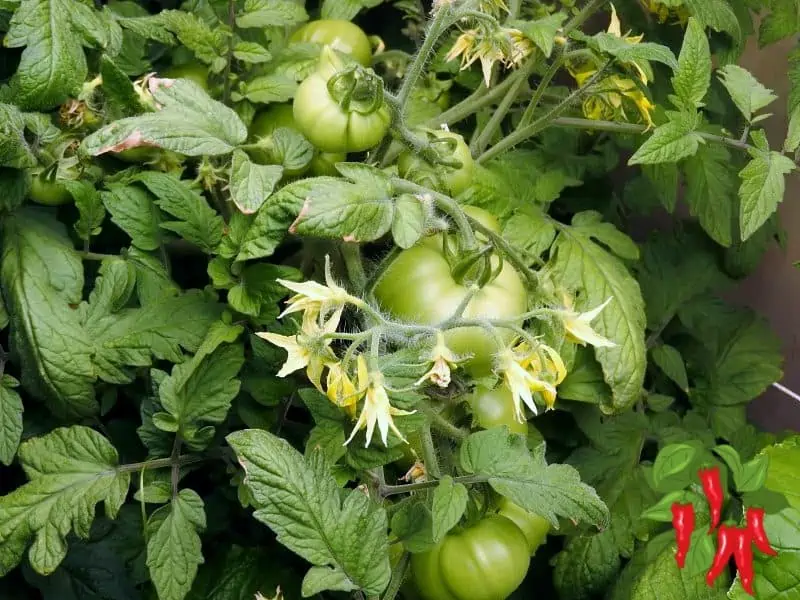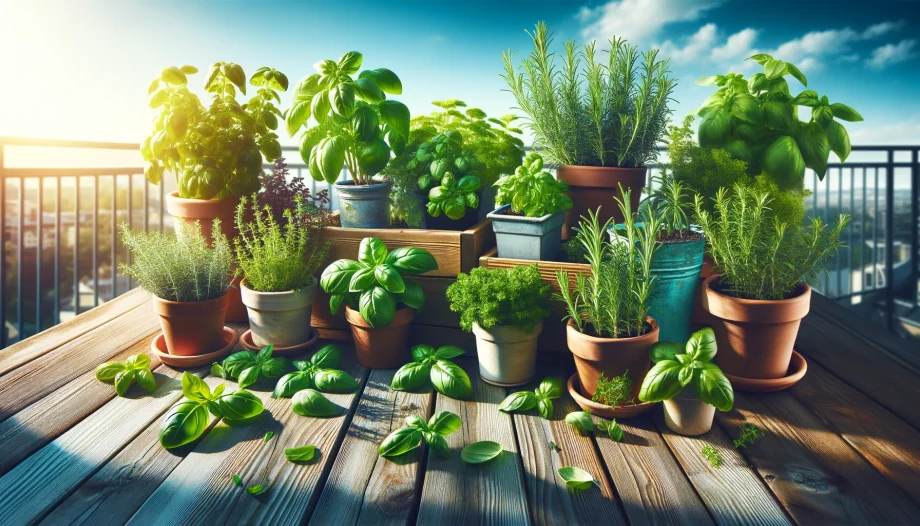This post may contain affiliate links. If you buy something from one of our links we may earn a commission. Thanks

Discover the joy of growing herbs on balconies! Our guide makes it easy to transform your small space into a lush, aromatic herb garden.
Growing Herbs Key Takeaways:
- Growing herbs on balconies is a delightful way to garden in small spaces.
- It involves selecting suitable herbs, using the right containers, ensuring adequate sunlight, and regular watering.
- It’s ideal for fresh, home-grown herbs right at your doorstep, adding flavor to your meals and greenery to your urban living space.
Growing Herbs on Balconies: A Guide to Balcony Herb Gardening
Ever thought about growing herbs on balconies? It’s easier and more rewarding than you might think!
Join us as we guide you through turning your balcony into a fragrant, green oasis, perfect for any urban gardener.
Stepping out onto your balcony, you’re greeted by a burst of aromatic scents and lush greenery.
A small, yet vibrant array of herbs from the zesty punch of basil to the earthy tones of rosemary bask in the gentle sunlight.
This isn’t a scene from a countryside garden; it’s your very own urban oasis. Welcome to the world of balcony herb gardening.
Growing Herbs on a Balcony
- Balcony herb gardening: An urban delight: Perfect for city dwellers, a balcony herb garden transforms limited space into a green sanctuary. Whether you’re a culinary enthusiast or a nature lover, a small herb garden offers a slice of nature right at your doorstep.
- Space isn’t an issue: Think your balcony’s too small? Think again. Herb gardens don’t demand much room. With a few pots and some creativity, even the tiniest balconies can flourish with life.
- No prior green thumb required: You don’t need to be a gardening guru to start. Most herbs are forgiving and easy to grow, making them perfect for beginners.
- A touch of flavor and health: Imagine plucking fresh herbs right before cooking. Not only do they enhance your dishes, but they also bring a dose of freshness and health to your meals.
- Therapeutic benefits: Gardening, even on a small scale, is known for its relaxing and therapeutic effects. It’s a peaceful retreat from the buzz of city life.
- Sustainable living: Growing your own herbs is a step towards a more sustainable lifestyle. It reduces the need for packaged, store-bought herbs and cuts down on food miles.
Moving on to part 2, we’ll discuss how to assess your balcony for herb gardening.
Nothing tastes as good as fresh produce. It tastes even better when you pick it in your own garden. What if you don’t have much space or no yard? You can have some vegetables and herbs growing on a sunny patio, porch, or deck in containers. A few minutes of planning and preparation will improve your success and enjoyment of any container garden. Michigan State University
Assessing Your Balcony for Herb Gardening
This section will cover the importance of understanding sunlight exposure and the impact of balcony orientation on herb growth.
Creating a herb haven on your balcony starts with understanding its unique character.
Sunlight, the lifeblood of plants, plays a starring role here.
But don’t worry if your balcony isn’t basking in the sun all day; many herbs are quite forgiving and adaptable.
Sunlight: The Game Changer in Herb Growth
- Observe Your Balcony’s Sun Pattern: Spend a few days noting how the sun dances across your balcony. Does it enjoy a full day of sunshine, or does it lounge in the shade? This will guide you in choosing herbs that will love your balcony as much as you do.
- The Direction Matters: South-facing balconies are like sun magnets – great for sun-loving herbs. East or West? You’ve got the morning or afternoon sun covered. North-facing? It’s the realm of shade-tolerant herbs.
- Adapting to Your Sunlight Situation: No south-facing balcony? No problem. Many herbs can still flourish in partial shade. It’s all about matching the herb to your balcony’s sun profile.
Balcony Orientation and Its Impact
- South, East, West, or North: Each direction offers a unique growing condition. South for sun worshippers, east and west for the moderate fans, and north for the lovers of cool shades.
- Herbs for Every Direction: While basil and rosemary bask in the glory of the southern sun, herbs like mint and parsley can thrive in less sunny spots.
- Maximizing Your Balcony’s Potential: With the right herb choices, any balcony orientation can become a successful herb garden. It’s about playing to your balcony’s strengths.
Balcony herb gardening isn’t just about throwing seeds into pots and hoping for the best.
It’s a delightful blend of understanding your space and matching it with the right green companions.
Next up, we’ll explore how to choose the right herbs for your balcony garden, considering factors such as personal culinary preferences and specific balcony conditions.
Choosing the Right Herbs for Your Balcony
Embarking on your balcony herb gardening journey is like setting up your own personal farmers’ market.
The key? Knowing which herbs will love your balcony as much as your kitchen.
Marrying Your Culinary Loves with Your Garden
- Cooking Favorites: Think about what you love to cook. Adore Italian? Basil, oregano, and rosemary are your go-to. Fan of fresh teas or cocktails? Hello, mint and chamomile!
- The Lesson of Overenthusiasm: It’s tempting to turn your balcony into an herb supermarket. But remember, it’s not just about growing them; it’s about using them. Stick to what you love and will use.
Assessing Your Balcony’s Personality
- Sunny or Shady: Herbs like rosemary and thyme bask in the sun, while mint and parsley play it cool in the shade. Match your herbs to your balcony’s sun profile.
- Space Matters: Not all herbs are space-savvy. Got a tiny balcony? Compact herbs like thyme are perfect. More room? You can think about taller varieties.
- Maintenance Moods: Your time is precious. Some herbs, like rosemary, are low-maintenance, while others, like basil, need more TLC. Choose based on how green your thumb is or wants to be.
Best Herb Matches for Balcony Gardens
Basil: The sun-loving, bushy plant perfect for pesto.
Mint: Refreshing but invasive, it prefers its own pot.
Rosemary: Aromatic and low maintenance, it loves the sun.
Parsley: Bushy and versatile, it can handle some shade.
Oregano Sunloving bushy plant for Italian and Greek food.
Choosing the right herbs for your balcony garden is a delightful dance between your culinary preferences and your balcony’s unique characteristics.
Up next, we’ll talk about selecting the ideal containers. The homes for your herbs are as important as the plants themselves.
Let’s delve into the world of herbs in containers and how selecting the right ones can make a big difference in your balcony herb garden.
Selecting the Ideal Containers for Your Herbs
Containers are more than just pots; they’re the foundations of your balcony herb garden.
Choosing the right ones is a blend of practicality and aesthetics.
The Art of Container Selection
- Size Does Matter: Herbs love to stretch their roots. Pick containers that give them room to grow, typically with a depth of at least 6 inches. Think about the herb’s growth pattern when choosing.
- Drainage is Key: Overwatering can drown your herbs. Ensure your containers have holes to let excess water escape, keeping your herb roots happy and healthy.
- Material World: Terracotta breathes well but dries quickly. Plastic retains moisture but might lack style. Wood brings rustic charm but needs more care. Choose based on your balcony’s look and the care you can provide.
Space and Placement Considerations
- Herb Personal Space: Like people, herbs don’t like to be overcrowded. Give each herb its own container or ensure ample space in shared ones.
- Sunlight Symphony: Place your containers where they’ll get their sunbathing and shade needs met. Remember, some herbs love the sun more than others.
Container Creativity
- Repurposing with Style: Old buckets, tin cans, wooden crates – your balcony herb garden can be a hub of creativity. Repurpose with an eye for drainage and space.
- Matching Your Balcony Aesthetic: Your containers can be a reflection of your style. Match them with your balcony’s theme for a coherent and visually pleasing look.
Selecting the right containers for your balcony herb garden is a mix of practical considerations and personal style.
Up next, we’ll talk about preparing your balcony space and getting it ready to welcome your green companions.
Now, let’s focus on preparing your balcony space to create the ideal environment for your herbs to thrive.
Preparing Your Balcony Space for Herb Gardening
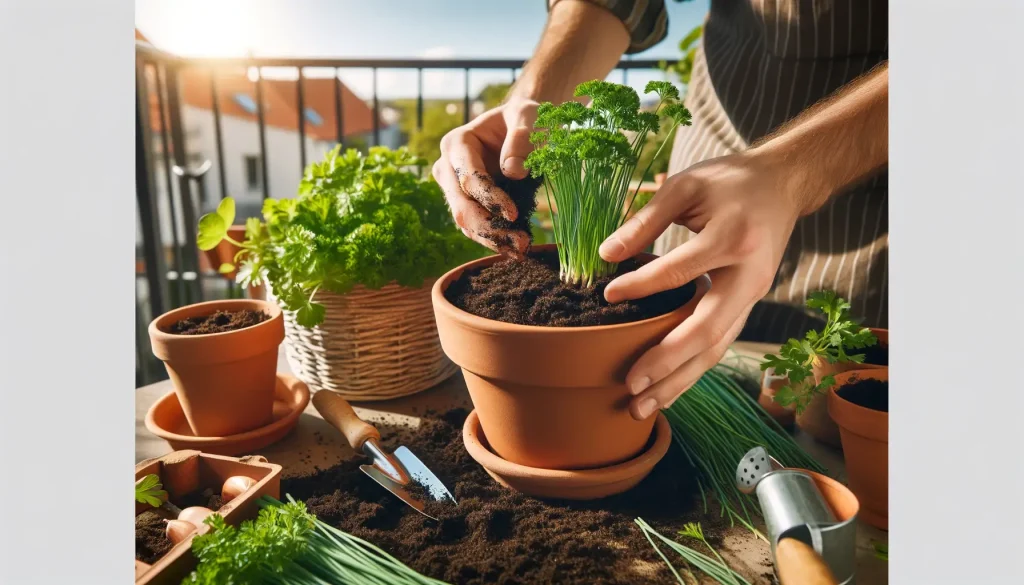
Setting up your balcony for a herb garden is like preparing a stage for a performance. It’s all about creating the right environment.
The Balcony Clean-Up Act
- Start Fresh: Sweep away debris, dust off the railings, and clear out the clutter. A clean balcony is a welcoming space for your herbs.
- Safety First: Check for loose railings or floorboards. If you have pets or kids, think about safety barriers.
Weighing and Protecting
- Weight Watchers: Remember, pots with soil and water can be heavy. Check your balcony’s weight capacity to avoid any surprises.
- Wind, the Invisible Foe: Balconies can be windy, which isn’t great for delicate herbs. Use screens or trellises as windbreakers to protect your plants.
Space Maximization
- Vertical Vision: Limited floor space? Go up! Wall-mounted planters and hanging baskets can be perfect for small balconies.
- Drainage Solutions: If your balcony lacks proper drainage, use trays under your pots. This keeps things tidy and protects your downstairs neighbors.
Preparing your balcony for herb gardening is about creating a safe, clean, and accommodating space. It sets the stage for a thriving herb garden.
Next, we’ll explore how to provide the right amount of sunlight and the best watering practices for your balcony herbs.
Ensuring Proper Sunlight and Watering for Your Balcony Herbs
Let’s dive into the essential aspects of sunlight and watering, crucial for the health and growth of your balcony herbs.
Sunlight and water are the lifeblood of your herb garden. Getting these two factors right is key to growing lush, flavorful herbs on your balcony.
The Sunshine Factor
- Observe and Learn: Track how sunlight plays across your balcony. Which spots get the most light? This will guide you in placing your herbs optimally.
- Embrace the Sun: Herbs like basil, rosemary, and thyme crave sunlight. Position them to bask in those rays.
- Rotate for Equality: If sunlight is a bit uneven, rotate your pots regularly. This ensures all sides of your herbs get their time in the sun.
- Reflective Boost: Use mirrors or light-colored walls to reflect light onto your herbs, especially in shadier balconies.
The Watering Equation
- Soil Check: Before watering, feel the soil. Dry? Time to water. Moist? Hold off for now.
- Water at the Base: Aim your watering can at the soil, not the leaves. This prevents disease and gets the water where it’s needed.
- Drainage is a Must: Make sure pots allow excess water to escape. Over-watered herbs are unhappy herbs.
- Consistency is Key: Establish a regular watering schedule. Herbs like consistency but don’t overdo it. Let the soil dry out a bit between waterings.
- Rain Check: If it’s a rainy season, adjust your watering to compensate.
- Herb-Specific Needs: Different herbs have different thirst levels. Mint likes moist soil, while rosemary prefers it a bit drier.
Proper sunlight and watering are crucial in nurturing a healthy and productive balcony herb garden.
Up next, we’ll cover the importance of fertilizing your herbs and how it contributes to their growth.
Fertilizing and Maintaining Your Balcony Herb Garden
Let’s discuss how fertilizing plays a crucial role in the health and vitality of your balcony herb garden.
Even in the limited space of a balcony, your herbs need the right nutrients to flourish.
Understanding fertilization is key to a lush, bountiful herb garden.
Nourishing Your Green Friends
- Organic vs. Synthetic: Choose between organic fertilizers like compost or synthetic ones for a quicker nutrient boost. Each has its benefits, so it’s about your gardening style and preferences.
- Timing is Everything: Fertilize during the growing season, usually spring or early summer. Mid-summer might call for a top-up, but avoid winter fertilizing.
- Read the Instructions: Over-fertilizing can harm your herbs. Follow the package instructions for the right dosage.
- Liquid Love: In containers, liquid fertilizers are often more effective. Mix with water and give your herbs a nutrient-rich drink.
Ongoing Care for Your Herbs
- Regular Check-Ups: Keep an eye on your herbs. Remove any yellowing or dead leaves to keep them looking and feeling great.
- Pest Patrol: Stay vigilant for any signs of pests. A healthy herb is less likely to get sick, so keep them strong with proper sunlight and watering.
- Room to Breathe: Avoid overcrowding. Your herbs need space to grow and thrive.
- Love and Attention: Remember, each herb is unique. Some might need more care than others. Get to know your herb’s specific needs and cater to them.
Fertilizing and maintaining your herbs are essential steps in ensuring a successful balcony herb garden.
Each herb comes with its own set of needs, but with a little care and attention, your balcony can become a thriving green space.
Next, we’ll explore the challenges of pest control and disease prevention in your balcony herb garden.
Controlling Pests and Diseases in Your Balcony Herb Garden
Let’s delve into the strategies for effectively managing pests and diseases, crucial for maintaining a healthy and vibrant balcony herb garden.
Even in the small ecosystem of a balcony garden, herbs can encounter pests and diseases.
Keeping these at bay is key to ensuring your garden’s health and productivity.
Keeping Your Herbs Healthy and Happy
- Vigilance is Key: Regularly inspect your herbs. Spotting trouble early, like unusual spots or wilting, can prevent bigger problems.
- Strong Plants, Fewer Problems: Robust herbs resist pests better. Ensure they get enough sun, water, and nutrients.
- Cleanliness Counts: Clear away dead leaves and debris. A tidy balcony garden is less inviting to pests and diseases.
- Breathing Space: Good air circulation is crucial. It prevents moisture buildup, reducing the risk of fungal diseases.
Organic Pest Control
- Natural Helpers: Introduce beneficial insects like ladybugs to control aphids and other common pests naturally.
- Manual Removal: For small infestations, sometimes just picking pests off by hand can be effective.
- Go Organic: Before reaching for chemicals, try organic options like neem oil or homemade sprays with garlic or chili pepper.
- Fungal Disease Prevention: Water at the base to avoid wet leaves. If you do spot a fungal issue, consider herb-friendly fungicidal treatments.
- Crop Rotation and Companion Planting: Move herbs around each season and plant pest-repelling herbs like marigolds or lavender nearby.
Managing pests and diseases in your balcony herb garden requires a combination of prevention, vigilance, and organic control methods.
By staying proactive, you can enjoy a healthy, thriving garden. Up next, we’ll focus on the rewarding tasks of harvesting and pruning your herbs.
Ready to learn about the best practices for harvesting and pruning?
Harvesting and Pruning: Reaping the Rewards of Your Balcony Herb Garden
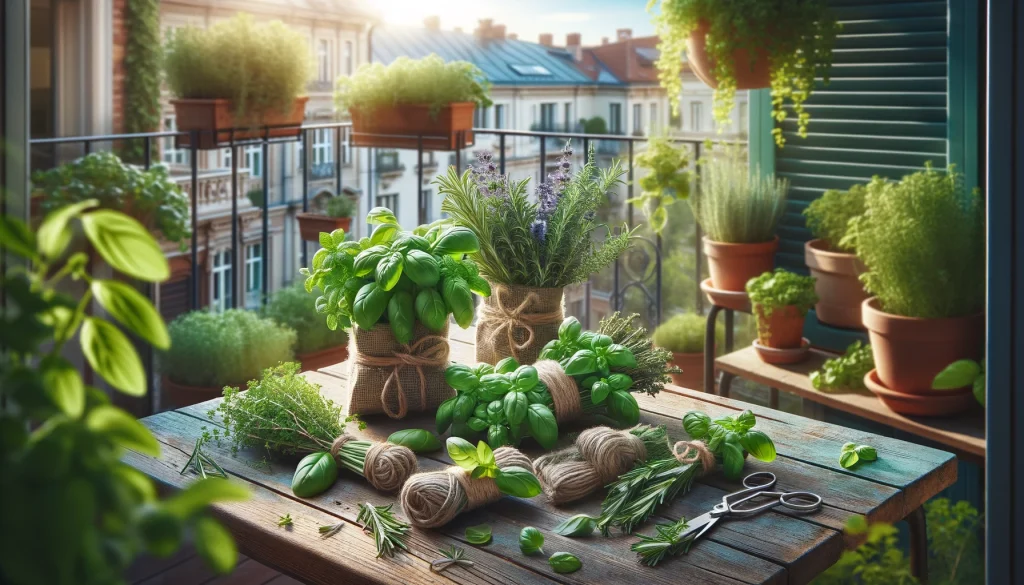
Let’s explore the rewarding practices of harvesting and pruning, essential for the health and productivity of your balcony herb garden.
Harvesting and pruning your herbs are not just chores; they’re integral to keeping your garden healthy and productive.
Plus, there’s nothing quite like the satisfaction of using your own home-grown herbs in cooking!
Harvesting: The Right Way
- Timing is Flavor: Harvest when the herbs have grown enough foliage, but before they flower, for the best flavor.
- The Right Cut: Use clean, sharp scissors or pruners. Cutting just above a set of leaves encourages more growth, especially in multi-stemmed herbs like basil.
- Little and Often: Harvest regularly but never take more than one-third of the plant at a time. This encourages growth and keeps your herbs healthy.
Pruning: Shaping Your Garden
- Shape and Health: Pruning isn’t just about size; it’s about health. Remove any dead or damaged leaves to keep your herbs in top condition.
- Encourage Bushiness: Pinch back herbs like basil and mint to prevent them from getting leggy and to encourage fuller growth.
- Woody Herbs Need Love Too: Perennial herbs like rosemary and thyme benefit from pruning to encourage new growth.
Storing and Preserving
- Keep Them Fresh: Store freshly harvested herbs in the fridge, wrapped in a damp paper towel.
- Drying and Freezing: For longer storage, dry or freeze your herbs. Drying is as simple as hanging them in a dry, ventilated area. Freeze them in ice cube trays with water or oil for easy cooking use.
Harvesting and pruning are about more than just keeping your garden tidy; they’re about enhancing and extending the life of your herbs.
With these tips, you can enjoy fresh herbs throughout the growing season and beyond.
Next, we’ll cover common mistakes to avoid in balcony herb gardening.
Common Mistakes to Avoid in Balcony Herb Gardening
In this section, we’ll highlight some common mistakes in balcony herb gardening and how to avoid them, ensuring your garden thrives.
Even with the best intentions, it’s easy to make mistakes when starting a balcony herb garden.
Knowing what to avoid can save you a lot of trouble and keep your garden flourishing.
Watering Woes
- Overwatering: It’s tempting to give your herbs a drink whenever you can, but too much water can lead to root rot. Let the top inch of soil dry out before watering again.
- Underwatering: Conversely, don’t forget about your green friends during hot spells. Regular checks will keep them from drying out.
Choosing Wisely
- Right Herb, Wrong Place: Each herb has its own sunlight and space needs. Match your herbs to your balcony’s conditions for the best results.
- Container Conundrums: The wrong container can stifle an herb’s growth. Ensure adequate drainage and space for the roots to prevent issues.
Sunlight and Pruning
- Sunlight Shortage: Herbs generally love sunlight. Ensure they get enough, but also be mindful of the intense afternoon sun which can scorch some herbs.
- Neglecting Pruning: Regular pruning promotes growth and prevents your herbs from becoming leggy or overgrown. It’s not just about size; it’s about health.
Pest and Disease Vigilance
- Pest and Disease Overlook: Regularly inspect your herbs. Early detection of pests or diseases can save your garden.
Avoiding these common mistakes can greatly increase your success in balcony herb gardening.
With a little care and attention, you can cultivate a thriving green space that’s both beautiful and productive.
Cultivating Your Own Green Space: Conclusion
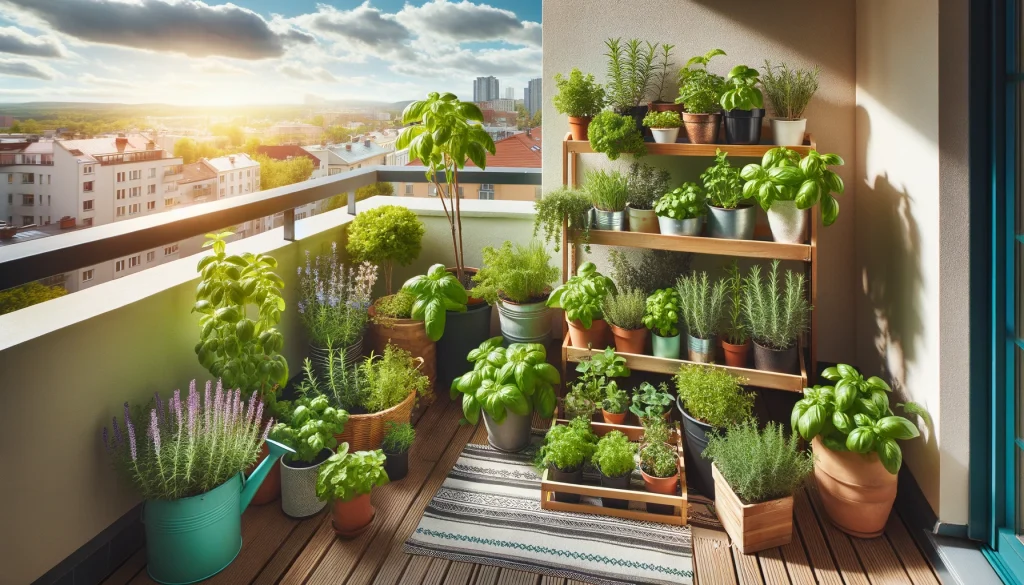
In conclusion, growing herbs on balconies is a delightful and rewarding journey.
Whether you’re a seasoned gardener or a beginner, the process of nurturing these plants offers immense satisfaction and numerous benefits.
- Adapting to Space and Sunlight: No matter the size or orientation of your balcony, there’s a way to make it a thriving herb haven. Understanding and utilizing your space effectively is key.
- The Joy of Harvesting: There’s something incredibly fulfilling about using herbs that you’ve grown yourself in your cooking. It brings a fresh, organic touch to your meals that can’t be bought.
- Health and Sustainability: Beyond the culinary delights, balcony herb gardening contributes to a healthier lifestyle and a step towards sustainable living. It’s a small yet impactful way to connect with nature and reduce your ecological footprint.
- Learning and Growing: Gardening is a continuous learning experience. Each plant has its own needs and quirks, and understanding them is part of the fun. Plus, it’s a great way to de-stress and indulge in a fulfilling hobby.
In essence, balcony herb gardening is more than just growing plants; it’s about creating a personal sanctuary, enhancing your culinary experiences, and contributing positively to your well-being and the environment.
So, why wait? Start your balcony herb garden today and enjoy the multitude of benefits it brings!
Visit my Amazon Influencer Page for videos and gardening products Grow Your Own Garden








